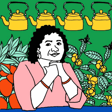Introduction and Special Episode
00:00:02
Speaker
This is Instant Coffee, a new podcast brought to you by the LSE Middle East Center and produced by me, Nadine Almanaspi and me, Ribalsleiman Hyder.
00:00:14
Speaker
We know you didn't expect us back until the new year, but we couldn't resist putting out this special episode about food, our favorite topic.
Conversation with Food Experts
00:00:21
Speaker
On this episode, Center Deputy Director Robert Claude talks to two of the biggest Middle East food experts, Claudia Rodin and Sami Zubeda. We were hoping to have them live as part of our 10-year anniversary celebration this month, but that unfortunately had to be cancelled.
00:00:38
Speaker
We are still honored to have them together on our podcast, sharing their amazing wealth of experience.
Middle Eastern Food in British Cuisine
00:00:43
Speaker
Claudia Rodin is cultural anthropologist and food writer. Sami Zubayda is emeritus professor of politics and sociology at Birkbeck University of London.
00:00:53
Speaker
Over to you, Bob. Hello, Claudia. Hello, Sammy. Welcome to the Mitten Center podcast. Thank you so much for joining us. We had, of course, very much hope to have you in person at an event at LSE in a large lecture theatre and serving food afterwards indeed as well.
00:01:11
Speaker
This is the best we could do in the circumstances, but we're really looking forward to hearing from you both this morning in this podcast about food.
Global Recognition of Middle Eastern Cuisine
00:01:19
Speaker
Perhaps we might start on the globalization of Middle Eastern food. It's something you've both observed in your careers, it's something you've both written about. Would you like to start by talking about this phenomenon of how Middle Eastern food has entered what Sami calls the global gastronomic playground?
00:01:37
Speaker
Well, we can all see how Middle Eastern and North African food has become part of our modern British eclectic cuisine. We can see it in restaurant menus, we can see it in magazines, on TV, on cooking competitions. It is everywhere. Yes, and it is also something that's happened all over the world. Three years ago,
00:02:04
Speaker
I asked a friend in LA about Middle Eastern food in America, and he said, he wrote, hummus has become a factor deep everywhere, feta, fella, fella, baba, banush are words that are firmly lodged in our vocabulary, much like pizza or croissant.
Innovation by Israeli Chefs
00:02:23
Speaker
Now, what is happening is while Turkish, Lebanese, and other Middle Eastern restaurants, they serve the same traditional standard menu of grills and mezze, Israeli chefs, inspired by Otolengi, they feel free to do their own take on tradition and to pick elements from all the Sephardian Mizrahi diasporas. They use soot from Yemen,
00:02:51
Speaker
Harisa from Tunisia, Duka actually from Egypt, preserved lemon from Morocco, Tahina sumac and pomegranate molasses from Syria, orange and almond cakes from Spain, at a time when a new global food culture that encourages
00:03:11
Speaker
experimentation and invention, chefs and food writers in the Anglo-Saxon world and everywhere else have become keen to use spices and aromatics and they have appropriated the Middle Eastern fusion nouvelle cuisine and made it their own.
Contributions of Eastern Mediterranean Region
00:03:33
Speaker
Yes well certainly you know and of course you get all kinds of innovations not only in restaurants but on supermarket shelves you see the great the amazing variety of hummus that you get in
00:03:49
Speaker
Stainsbury's and Waitrose and what have you. And I was especially intrigued to see that they have Moroccan hummus, which must be news to the Moroccans. But let me just say the region of the Middle East, which seems to have contributed the most to this items in the globalized Middle Eastern food,
Rich Culinary Heritage of Middle East
00:04:12
Speaker
seems to be this area which is also known as Eastern Mediterranean, you know, the area around Anatolia, southeastern Anatolia, plus the Arab Levant, what we call Bilad-e-Sham, the Syria, Lebanon, Palestine, plus Cyprus. Cyprus is part of this. And so, in fact, that is the area from which so many of the items, including the ubiquitous hummus,
00:04:40
Speaker
including the various salads and the pastries, the lahmajoun, all these items that are now so common are predominantly from this region, which in terms of ethnicity is
00:04:55
Speaker
quite diverse. So in fact, in this part, you have Turks and Arabs and Greeks and Armenians and Kurds. And so this is one reason why on the globalized stage you have claims to nationality of foods, you know, what is Armenian and what is Turkish.
Cyprus's Impact on British Cuisine
00:05:17
Speaker
And of course, this is quite irrelevant because in actual fact,
00:05:21
Speaker
It is geography rather than ethnicity. It's that region that contributed all these items. And that region is ethnically diverse. And it's impossible to say which is which in terms of ethnicity. Of course, the other areas which are, of course, very important astronomically, particularly Iran, I mean, that seems to be spreading less prominently
00:05:46
Speaker
but very definitely. And you know, the vogue for Persian cooking is much less known, but where it is known, it's highly, highly valued and very interesting. And the other thing, of course, is Egypt. Where does Egypt come in into this variety of the regions? And I know, Claudia, you've done most to bring Egypt into the equation, but then apart from that, there is very little spread
00:06:16
Speaker
or knowledge of Egyptian food. Koshari, which is an adopted Egyptian street food, is now becoming more known, nothing like Hamas and... Yes, I mean, I think why you did mention Cyprus,
00:06:34
Speaker
And perhaps it is through Cyprus that a lot of the things first came to Britain, because Cyprus, of course, was a British colony for a long time, longer than elsewhere. But also, when I first came to London or to Britain, the only place where you could buy anything Middle Eastern was a Cypriot cafe or a Cypriot grocery.
00:07:02
Speaker
to go to Cantish Town, to Camden Town, to get them there.
Migration and its Influence on Global Food Culture
00:07:06
Speaker
And they became the manufacturers. In fact, I remember being invited by or asked by Marx and Spencer to come and taste different varieties of homeless that their manufacturer was making for them.
00:07:25
Speaker
And it was many years ago, it was the first hummus that appeared in supermarket. And I went there to taste and the manufacturer was there. And he turned out to be Cypriot. But all the people working in the factory were Bangladeshi women.
00:07:45
Speaker
But so when I went, I said, well, you know, I'm not used to buying it ready-made because I make it myself. But I have a cousin who says the hummus of waiters is better than the hummus of Marx and Spencer.
00:08:04
Speaker
And this manufacturer said, I make it for Waitrose as well. So yes, the first restaurants that opened that were Middle Eastern were Lebanese. And they started opening at the time of the Lebanese Civil War. And so their groceries started opening then.
00:08:28
Speaker
So you can see that all kinds of things that have happened politically maybe, it is the manufacturers of a certain area or the people of a certain area who migrate and become cooks and chefs. Now I'm hearing there's a lot of
00:08:49
Speaker
cooks coming that are Syrian. These kinds of things actually create what becomes the thing that sells.
Lebanese Drinking Culture and Diaspora
00:09:00
Speaker
I think on the Lebanese, you know, why the Lebanese are so prominent, and they were even before the civil war, there is a, I don't know how important it is, but there is a historical factor there, which is first of all the countries or cities
00:09:16
Speaker
in which there was a public drinking culture or much more likely to have restaurants.
00:09:23
Speaker
So in fact, whereas, you know, places like Iraq, where I come from originally, public eating was traditionally mostly just markets and market stalls and where the drinking dens, the Meghana, were more or less hidden. You didn't develop a restaurant culture in the way in which the Levantine Mediterranean cities, particularly the Lebanese, but also the parts of Turkey, Istanbul and the Aegean,
00:09:53
Speaker
had developed a drinking culture which was very important in the starting of restaurants. And the other thing of course about the Arab Levant is the diaspora which started of course much earlier than the civil war. The migrations of Syrian, Lebanese, Palestinians
00:10:13
Speaker
to North and South America and to Africa was an important part of spreading the food cultures into these variety of areas. And to think about Greeks and Cypriots in London, I remember even earlier on, the only place where you could get Middle Eastern ingredients in London was the Hellenic Provision Stores on Charlotte Street.
00:10:42
Speaker
where we used to make special pilgrimage there every now and again, especially if you are from outside London.
Globalization of National Cuisines
00:10:50
Speaker
So in fact, we've come a long way since then. Thank you, Sammy. Claudia, this is wonderful. It's super to hear you scan across the region and time like this. I wonder, might you take the conversation on to discussion of how food and identity and politics intertwine? What can I say?
00:11:09
Speaker
If you are just sitting somewhere in Syria or Iraq or what have you, you know, you may think about your food is against that of your neighbors or of one city is against another. But the idea of national cuisines is very, if it's there at all, it's very underdeveloped. So it's really only in the centers of migration and the centers of travel and
00:11:34
Speaker
It's only in this context that you start talking about whose food is it. The question of national cuisine is a phenomenon of globalization, of migration, of diasporas.
00:11:49
Speaker
to say of any particular items like lahmajouni is it Armenian, is it Armenians of course were famous cooks and they were prominent in the catering businesses but that doesn't necessarily indicate that particular dishes are ethnically specific to them and so this is you know the point that I'm making is that
Food, Identity, and Politics
00:12:13
Speaker
geography is more important than ethnicity, but then in the diasporic and global stage, nationality and ethnicity becomes a point of contention in relation to the ownership of foods and culinary cultures.
00:12:31
Speaker
Thank you, Sammy. Claudia, might you like to develop that perhaps with reference to, I know you've written about the continuity and also the transformation of dishes over time, which you've traced back historically in the records. I mean, for example, writings from the 13th century, which you might link to a tagine today or, you know, the development of the korma, these kind of ideas. Would you like to expand through that?
00:12:55
Speaker
Yes, but I think I'd like to add also to what Sam is saying now that there is some anger in some countries because their products are being sold by another country. And so it's a financial thing.
00:13:13
Speaker
For instance, well, the Palestinians feel robbed of their dishes. They feel robbed by Israeli chefs at the moment. And Lebanese feel robbed by Israel because Israel sells more homeless abroad. But yes, there is also some strong feeling and some countries that neglected their own cuisine
00:13:40
Speaker
have become very concerned with holding on to what they feel is their real cuisine. People just didn't go out to eat, but now eating out is a very important thing
00:13:57
Speaker
especially for tourism. And you see in Turkey there are chefs who are researching what they had ignored until now their regional cuisines and refining them, bringing them up to date, creating a sophisticated
00:14:18
Speaker
kind of hot cuisine.
Evolution of Historical Recipes
00:14:21
Speaker
In Morocco you find restaurants and grand hotels and in riads, they are putting the kind of
00:14:30
Speaker
home dishes, the grand celebratory dishes, the one that they used to have for weddings, for instance, they are putting them on their menus. There is something happening there where people want to find what is the best of their own cuisine in the countries itself.
00:14:52
Speaker
Now you're asking me yes about the discovery by myself when I first went to the British Library looking for Arab cookbooks and that was 60 years ago when the Jews had left Egypt after Suez
00:15:12
Speaker
and where we were looking for recipes because there had been no cookbooks. Well at the British Library there were no contemporary cookbooks on Arab food and all the librarian had to show me were those 13th century cookbooks that were found in Baghdad
00:15:35
Speaker
in Damascus, in the Maghreb, in Spain actually, but in Arabic. I really started cooking. I was absolutely enthralled and I started cooking constantly from those old books and I was enthralled because many of the dishes that were
00:15:58
Speaker
mentions had similar names, similar combinations of ingredients, of spices. The recipes that I was collecting from people leaving Egypt at the time, I was hearing from people who had come from Morocco, from Tunisia,
00:16:17
Speaker
And I found so much that was in those books that, for instance, in Baghdad. In a book or rather essays from Maxime Rodin's somewhere, he described dishes in Damascus in the 13th century. I found a lot that my family actually cooked.
00:16:40
Speaker
So I really felt that we must be going back a long way if a dish we still ate or were mentioned in Damascus. And I'm saying this because my family or three of my grandparents actually came from Aleppo. Well, yes, there may be continuities, but there are also some very important discontinuities. Of course, one of the
00:17:09
Speaker
most important episodes that lead to discontinuities is what we call the Colombian Exchange. All the foods that came from America after the 15th century and some of them didn't get there until much later and notably the tomato. I mean they had no tomatoes until some places from the 18th century in the Middle East and some places like Baghdad which was a bit backwards not until the early 20th century
00:17:36
Speaker
So can you imagine Middle Eastern food without tomatoes? Apart from tomatoes, there's also peppers and chilies. Then, you know, you have, of course, the fasolia, the ariko beans, corn,
00:17:51
Speaker
the whole gamut of potatoes, all the things that came from the Americas which revolutionized the culinary cultures of the old world, including the Mediterranean and the Middle East.
00:18:06
Speaker
The other thing, of course, is there are so many dishes that are mentioned in these, what Lodiya referred to the medieval manuals of Kukare, which have disappeared or reappeared somewhere else in a different guise, or names for foods. The words survived
00:18:27
Speaker
But the foods did not.
Transformation of Dishes Across Regions
00:18:29
Speaker
One interesting one is borani, or borani, which occurs in Abbasid cooking, referring to an aubergine dish. And now you have borani in various countries, you know, from Iran to Yugoslavia, but it designates many different dishes, primarily, or in Iran, for instance, it's a dish of spinach,
00:18:54
Speaker
and yogurt. I think one of my favorite examples in this respect of the continuity discontinuity is a dish from Abbasid times, which was called Sikh badge. Sikh badge was meat that had been boiled cooked in vinegar and sweetened with honey with a variety of spices, including saffron.
00:19:21
Speaker
Now, this dish percolates down and, you know, even poor people use it, especially maritime communities use it with fish, you know, fish cooked or captive vinegar. And, but it disappears from Middle Eastern cookery. But then it appears in a different guise in Spain, when you have escabeche,
00:19:46
Speaker
which is, again, fish that is cooked or kept in vinegar. And of course, that spreads also in the rest of Europe, Escabeche in France, and many other examples of it. So here we have kind of discontinuity in one place and reappearance in different guises with that label in other places. Then you have the words, you know, things like kebab,
00:20:14
Speaker
kebab is an arabic word and i traced the word kebab even in the abbasin writer al-jahir who has a wonderful book called kitab al-bukhala the book of maisaz it's a humorous book about all the
00:20:31
Speaker
ruses and habits of Mysore people and of course they are Mysore predominantly with food and at one point he uses the word kebab as a verb in which he says they made it a kebab over the fire and here he's referring to fish that was made like that but the word kebab as a generic thing did not appear till much later
00:20:58
Speaker
what the grilled meats, they were called shua, which means grilled. What I'm saying is that, you know, there may be some continuities. And of course, one of the issues of continuities is the cooking pots. And the cooking pots, of course, and the sources of fire and the sources of cooking were very different at different points. You know, you had a lot of technical innovations. And in fact, all these have led to
00:21:26
Speaker
definite discontinuities in the culinary traditions and the dishes that came there.
Global Spread of Culinary Ideas
00:21:32
Speaker
That was wonderful, really, really fascinating. Thank you, Sami. Claudia, thank you so much too. Sadly, we are running out of time. I wish we could go on, but before I let you go, I wonder if I have to take the opportunity to ask two such distinguished food writers to give us perhaps one favourite recipe or dish.
00:21:49
Speaker
One recipe that was given to me by my sister-in-law's grandmother was an almond and orange cake that now has become famous all over the world. It's not my particularly favorite one but it I'll give it as what is unusual is that two oranges are boiled until they're very soft and then
00:22:16
Speaker
the pips are removed they're cut open and they are blended with eggs and sugar and almonds and that is all it is and you pour it into into a cake tin and you bake it and it is you just it really is all over the world. When I went to even
00:22:39
Speaker
to India to Mumbai literary festival several people were saying they were cooking it there and certainly it became in Australia every single recipe a restaurant that was fashionable had it on the menu and well sort of strange things happen. Yes that's remarkable and thank you Sammy is the one dish one recipe you care to share?
00:23:10
Speaker
Well, yeah, if I choose one, which I like particularly, is from my home background in Baghdad, dish called Kitchri, which is really Indian in origin, but was quite common among Baghdadi Jews. It was eaten once a week on Thursday, which for some reason was a non-meat day. And the Kitchri was non-meat, was eaten with butter and
00:23:38
Speaker
yogurt, which otherwise would be forbidden in Jewish ritual. And chitry is rice and lentils, which had been boiled with a little bit of tomato paste. And then you fry garlic and cumin in butter and pour it over this combination. And then you serve it hot
00:24:04
Speaker
and you melt more butter into it and you eat it with a yogurt sauce. Sometimes, you know, to make it even more dairy, you have fried cubes of cheese, you know, halloumi type cheese, which is also garnished and onions, which are also fried and put on top. And that is one of my favorite dishes, which I still cook here. I adapt it. I cook it in a different way.
00:24:31
Speaker
And of course, that's also it came from India. And it's also the basis of the very popular Koshari in Egypt. That's a lovely example. Terrific. I think Rabaul and I are getting rather hungry listening to this. I was inspired. Thank you. Savi, Claudia, thank you so much. You've been so generous with your time and your thoughts.
Wrap-up and Future Hopes
00:24:51
Speaker
It's been wonderful having you on the podcast. I hope we can see you next year in person and eat some real food together. That would be wonderful. But thank you for your time today. It's a great pleasure.
00:25:01
Speaker
Pleasure. Thank you Sami and Claudia for taking the time to speak to us and thank you as always for tuning in. We hope you enjoy the holidays and we look forward to seeing you again in 2021 with a whole new season of instant coffee.




















